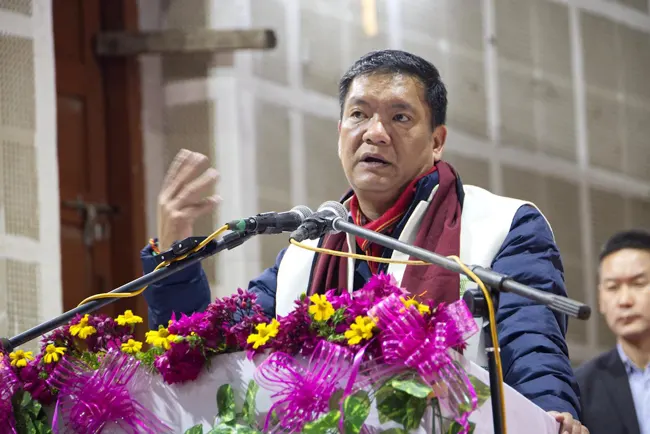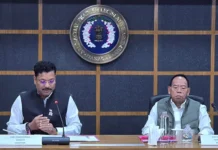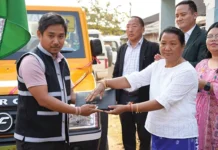TUTING, 22 Jan: Chief Minister Pema Khandu said that his government has chalked out a blueprint to overhaul the existing planning process, which will be implemented after the elections.
Khandu said that the new planning process will extensively involve stakeholders at the ground level as it is the people in villages and officers on ground, who actually know what is required.
“The entire process will be from bottom to top, not like the erstwhile top to bottom process,” the Chief Minister said in a public meeting here in Upper Siang district on Monday.
He assured that the new model of planning will accelerate holistic development of all villages in the state and that government resources will be optimally utilized without wastage.
Khandu appealed to members of the five communities – Memba, Khamba, Adi, Mishmi and Tangam – to coexist
peacefully and become equal stakeholders in development of the border areas.
He said that the communities residing in the northern most part of the district that shares international border with Tibet-China have been living peacefully since ages and that there should not be any issue that disturbs this relationship of brotherhood.
“Upper Siang’s Tuting administrative division is one of the most vivid and colourful in terms of the people living here. Each one of them is unique, distinct and independent. Your peaceful coexistence and cultural amalgamation is the hallmark of the district,” he said.
Khandu informed that under the central government’s ambitious flagship programme ‘Vibrant Village,’ Tuting area will witness a rapid transformation.
Vibrant Villages Programme (VVP) – a Centrally Sponsored Scheme launched in 2023 – aims to develop villages in 46 border blocks in 19 districts.
The programme envisages focused areas of interventions in the select villages for creation of opportunities for livelihood generation through promotion of tourism and cultural heritage, skill development and entrepreneurship and development of cooperative societies including agriculture/horticulture, cultivation of medicinal plants/herbs etc. The interventions also include providing road connectivity to unconnected villages, housing and village infrastructures, energy including, renewable energy, television and telecom connectivity.
“And recently Union Ministry of Home Affairs (MHA) has sanctioned about 1022 km of roads under the programme for Arunachal Pradesh. We are thankful to the Modi government that Arunachal Pradesh has the most number of border villages listed under the programme,” Khandu said.
Hailing Prime Minister Narendra Modi for remodeling the concept of border villages, Khandu said that “Gelling, which was known as the last village on the Indian side in Tuting sub-division, today has become the ‘first village’ on the Indian side.”
He said under the present central and state government, connectivity sector in the state has witnessed a sea-change. “Be it roads, air, rail or digital, all modes of connectivity has significantly improved in the last 7-8 years,” he added.
Appreciating local legislator and minister for health Alo Libang for all round development of the district, he noted that once the new Yingkiong-Tuting road is complete, the district will witness a surge in tourism activities.
Khandu in presence of MP Tapir Gao, Libang and MLAs Kaling Moyong and Kento Jini inaugurated a bridge over Nyigong River at Tuting.
Later in the day, Khandu reached Yingkiong, the district headquarters and inaugurated several developmental projects that include upgradation of road from Aalo-Yingkiong BRTF road to Dite-Dime to Migging BRTF road, a new CHC building and EAC office at Jengging, cement concrete pavement Nubo road, a micro hydel station (2x25kw) at Man and a micro hydel station (1x30kw) at Palling.
At Yingkiong Khandu and his entourage was joined by MLAs Talem Taboh and Kanggong Taku. (CM’s PR Cell)



